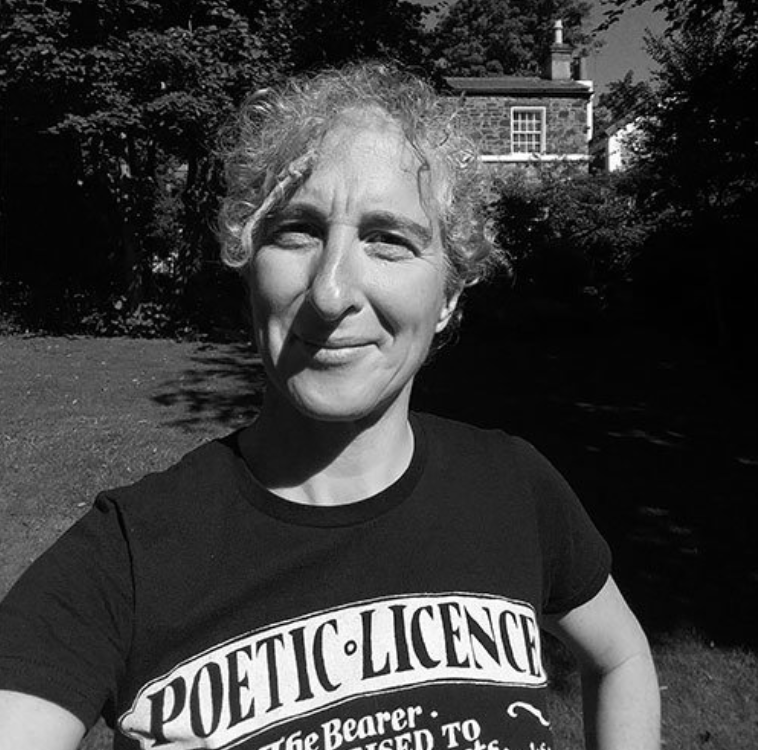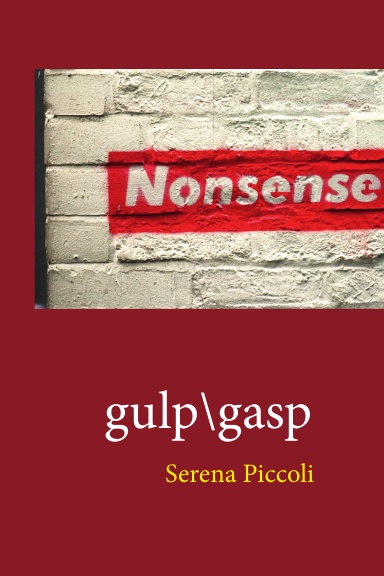Published March 4th, 2024
Interview
by William Allegrezza
When one thinks of Serena Piccoli, one immediately imagines the engaged artist. As David Romero says, “Serena Piccoli's poetry is a hammer seeking to beat imperialist swords into ploughshares.” Piccoli is a poet, photographer, fiction writer, translator, dramatist, and performer. In other words, she is busy working on multiple fronts in English and Italian, and her works, whether in photographic or poetic form, refocus the reader on important societal issues, from the mistreatment of workers in Italy to the abuses of former US president Trump. Her poems don’t present us with images of elaborately named plants, for she writes on the streets and invites us to join her to see what is happening — she asks the reader to become engaged.
In this short interview, she discusses poetry and politics, poetic performance, translation, and the current state of poetry. She adds a lens through which we can take a look at her work, and she injects into English poetry a political edge that is too often lacking. The question with her work is not why she writes political poetry, but why don’t others write it more often. If poets are stewards of life and culture, why are so many not defending both vocally when atrocities happen? Piccoli is convincing in her argument for others to join her, and she makes that argument in her latest book gulp/gasp, put out by Moria Books.
William Allegrezza: As a dual-language poet in Italian and English, how did writing in English for gulp/gasp tie into the political themes in the book? In other words, does it feel more appropriate to write these poems in English rather than Italian?
Serena Piccoli: I don’t think it has something to do with being more appropriate. The human brain is fascinating. I have been writing poems about political themes both in Italian (my mother tongue) and in English (my second language learned at school and university) for years now. But back in 2016 my brain — for no apparent reason — decided to write almost all the poems in English. I have no idea why. I didn’t choose it, but I like it. As you can see, I write in English about contemporary issues that go from people fleeing wars, famine and torture in Africa to detention camps in the highly democratic Europe far from the public’s eyes and ears to English free school meals; from Julian Assange to the struggle of the Kurdish people. These are international themes that I can write about in Italian, but my brain has opted for the English language. I find it fascinating, and I leave poetry free to come out in the way it wants.

Allegrezza: The political themes jump out in your work. How does writing about political themes help in the real world?
Piccoli: I write about political themes because I want to raise awareness but also in solidarity to those who are struggling. I believe that if we get united, we can fight injustices better and stronger.
Allegrezza: Do you think poets have a duty to write about social/ethical/political topics when they become aware of issues?
Piccoli: I think so. I don’t mean that we all have to write about political topics in every single poem, but why not in some of our poems? A poem can have a couple of lines, among others, about a social or an ethical issue. Would that be a big effort?
Take the scene we sometimes see at poetry festivals or poetry readings: a flow of poets blah blah blahing or reading lines, I guess, from their teenage diaries, when there is so much going on in our society that has a strong impact on many of us. Those who gurgle these self-referential lines, as if the sun turns around them and they’re the center of the universe, I really don’t know where they live.
Allegrezza: So if poetry should contain a bit of the political, what about translation? You are an excellent translator as well. How does your writing of poetry connect with the work you translate? Do you see them as part of the same project?
Piccoli: I have translated some works of poet, professor and essayist Adeena Karasick and some contemporary African women poets whose poetry is political. At the same time I enjoy translating poems that aren't engagés, but are written by socially engaged poets: Indirectly, it's a radical choice.
Allegrezza: Clearly, you like to write and translate socially engaged work. How does that connect with your background in theater? In other words, is your poetry theatrical? Do you use elements of the stage to provide witness to events or experiences? For example, in your poems about Caporalato, like “The Sun Kisses the Prettiest,” or the abuse of Kurdish women, does your theater background help you portray the scenes?
Piccoli: Absolutely. Funny enough when my plays are staged, audiences say that my plays are very poetical. When readers or the audience approach my poems, they say they are theatrical. I really love that! How interesting. In some of my poems I use direct speech. A poet once criticized that, which is totally fine, I understand her point of view. But for me the use of direct speech is very effective and immediate and gives the poem a stronger impact.

Allegrezza: Direct speech can be effective in a poem. Could you say more about your use of it and how you would like it to affect the reader?
Piccoli: I use only a few lines of direct speech especially in my political poems, so that they can remain in the mind of the reader, sediment and echo for a long time. The two words of direct speech, “Lucky you — he said,” in the poem you mentioned (“The Sun Kisses the Prettiest”), are the words of the Caporale, the gangmaster, who recruits and profits from an illegal form of labor in the agricultural sector in specific areas of Italy. Caporale is the modern slaver. Thousands of people die every summer from the poor conditions in which they live and of many of them we don’t even know their existence. They die, and the Caporale just turns his head. He has to focus on the profit, not on people.
We have a saying in Italian: The sun kisses the prettiest. It’s a funny expression used in a nice and cheerful way. I use it as an expression of derision of the Caporale towards the modern slaves working under the burning sun, 12 hours a day — every day — for three euros an hour, in 104 degrees. He also adds “Lucky you” referring to the laborer working. I wish these few words echo for long in the minds of the readers and make them at least think of these hundreds of thousands of people working and the other hundreds of thousands of people profiting.
The first step is to be aware of the situation and then maybe choose to avoid buying those products.
Allegrezza: Do you see a difference in Italian poetry and English poetry in terms of engagement with the world? If so, what is it, and what poets do you think are doing work similar to what you are doing?
Piccoli: I don’t see a big difference in terms of engagement between Italian poetry and English poetry. The dynamics are pretty much the same too.
There are many poets who take a stand either with a few or with many poems. I have seen Matt Sedillo and David Romero live in a few festivals where we were both invited, Pina Piccolo, Sandro Sardella and Francesca del Moro have done a great job too, just to name a few. At the moment I am worried about another engaged poet: Palestinian writer Mosab Abu Toha, who — as today's report suggests (November 20, 2023) — might have been kidnapped by Israeli forces. He lives in Gaza. He has recently published poetry about life in Gaza in major American outlets like The Atlantic and The New Yorker. He is also the founder of Gaza’s first English-language library, named after Edward Said. I recommend reading his book, Things You May Find Hidden in My Ear.
Allegrezza: I suspect that many are worried for Mosab Abu Toha with the current situation in Gaza. Just a few days ago, Anne Boyer resigned from The New York Times Magazine and stated, “Sometimes the most effective mode of protest for artists is to refuse.” How do you think poets should respond to the current situation? Should their response be any different than anyone else's?
Piccoli: Poets have a voice that can be read, heard, and easily shared via social media. Our voices can be quickly transmitted to many ears and eyes. We should get informed, learn, keep an independent mind and raise awareness, without forgetting to express solidarity to those who are suffering. Showing solidarity is essential. It doesn’t take much energy to do it.
We should speak up; we should make our readers reflect on the current topics. We should point out all the mistakes our politicians, the elites, and our authorities make, all the bad aspects of our society. Yes, we can write about flowers and the moon as well, but not only that, please! Let’s help each other. Some poets and some people from the audience at Poetry Festivals come to me and whisper (whisper!): At last someone who speaks out. Thank you. You’re very brave.
I don’t have any superpowers, I am not Wonder Woman, I just share what I see around me. It doesn’t take a lot of effort. And if I can do it, then anyone can.
I agree with Anne Boyer that a refusal can be a good way of protest. We should react to social injustices in every peaceful way. Let’s stay human and help stay human.
Nationality: Italian-American
First Language(s): English
Second Language(s):
Italian,
Spanish,
Ancient Greek
Supported by:

